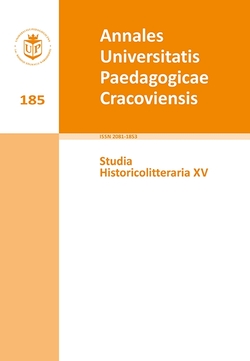Dwa rodzaje dyskursów w polskiej literaturze lagrowej
Main Article Content
Аннотация
Two types of discourse in Polish “gulag literature”
The purpose of this article is to show the differences in presenting the reality of concentration camps in polish postwar prose. I am presenting two discourses in gulag literature: humanistic and anti-humanistic. I find differences mainly in presenting the reality of concentration camp and I consider them with regard to concentration reality through the prism of stable humanistic values or internal perspective. I concentrate on showing the condition of human being in gulag reality and the perception of human dignity, the basic experiences in labor camp conditions such as people behavior and attitude, omnipresent death, and relations between people. In the summary I try to bring awareness to the process of language conventionalization and perpetuation of symbols in description of concentration camps.
Key words: postwar prose; concentration camps; discourse;
Скачивания
Article Details

Это произведение доступно по лицензии Creative Commons «Attribution-NonCommercial-NoDerivatives» («Атрибуция — Некоммерческое использование — Без производных произведений») 4.0 Всемирная.
ПОЛИТИКА АВТОРСКИХ ПРАВ
Издатель «Annales Universitatis Paedagogicae Cracoviensis. Studia Historicolitteraria» имеет право использования и распространения всех опубликованных в издании материалов на основании договора неограниченной во времени неисключительной лицензии - предварительно заключенного на неоговоренное время с каждым автором конкретного произведения на оговоренных в том договоре условиях использования.
ПОЛИТИКА ОТКРЫТОГО ДОСТУПА
«Annales Universitatis Paedagogicae Cracoviensis. Studia Historicolitteraria» это издание с открытым доступом, а все его содержание доступно бесплатно для пользователей и организаций на основаниях неисключительной лицензии CreativeCommons (CC BY-NC-ND 4.0). Пользователи могут читать, скачивать, копировать, распространять, производить поиск или переходить по ссылкам к полным текстам статей в этом издании без предварительного согласия издателя либо автора при условии указания источника доступа и авторства данной публикации. Это согласуется с определением открытого доступа BOAI (http://www.soros.org/openaccess).
Библиографические ссылки
Bolecki W., Zamiast wstępu (doświadczenie i modernizm), [w:] Literackie reprezentacje doświadczenia, red. W. Bolecki, E. Nawrocka, Warszawa 2007.
Borowski T., Proza, oprac. S. Buryła, t. 1, Kraków 2004.
Domańska E., Muzułman: świadectwo i figura, [w:] Zagłada. Współczesne problemy rozumienia i przedstawiania, red. E. Domańska, P. Czapliński, Poznań 2009.
Drewnowski T., Ucieczka z kamiennego świata. O Tadeuszu Borowskim, Warszawa 1992.
Gawalewicz A., Refleksje z poczekalni do gazu. Ze wspomnień muzułmana, Kraków 1968.
Grzesiuk S., Pięć lat kacetu, Warszawa 1989.
Janion M., Porzucić etyczną arogancję, [w:] Porzucić etyczną arogancję. Ku reinterpretacji podstawowych pojęć humanistyki w świetle wydarzenia Szoa, red. B. A. Polak, T. Polak, Poznań 2011.
Kielar W., Anus Mundi. Wspomnienia oświęcimskie, Kraków 1976.
Kossak-Szczucka Z., Z otchłani. Wspomnienia z lagru, Częstochowa 1947.
Krupa B., Wspomnienia obozowe jako specyficzna odmiana pisarstwa historycznego, Kraków 2006.
Latawiec K., Zasada estetycznego dystansu w prozie senioralnej Mariana Pankowskiego, „Annales Academiae Paedagogicae Cracoviensis. Studia Historicolitteraria” 2005, nr 26(5).
Morawiec A., Literatura w lagrze, lager w literaturze. Fakt – temat – metafora, Łódź 2009.
Orzeł-Wargskog O., Granice godności. Granice literatury, [w:] Porzucić etyczną arogancję. Ku reinterpretacji podstawowych pojęć humanistyki w świetle wydarzenia Szoa, red. B. A. Polak, T. Polak, Poznań 2011.
Pankowski M., Z Auszwicu do Belsen. Przygody, Warszawa 2000.
Piotrowski P., Artysta w Auschwitz. O (nie)banalności sztuki, [w:] Zagłada. Współczesne problemy rozumienia i przedstawiania, red. E. Domańska, P. Czapliński, Poznań 2009.
Słownik literatury polskiej XX wieku, red. A. Brodzka, Wrocław 1992, hasło: obozowa literatura.
Szmaglewska S., Dymy nad Birkenau, Warszawa 1994.
Tomasik W., Ikona nowoczesności. Kolej w literaturze polskiej, Wrocław 2007.
Werner A., Wstęp, [w:] T. Borowski, Utwory wybrane, oprac. A. Werner, Wrocław 1991.
Werner A., Zwyczajna Apokalipsa. Tadeusz Borowski i jego wizja świata obozów, Warszawa 1971.
Wyka K., Pogranicze powieści. Proza polska w latach 1945-1948, Kraków 2003.
Żywulska K., Przeżyłam Oświęcim, Warszawa 1960.
